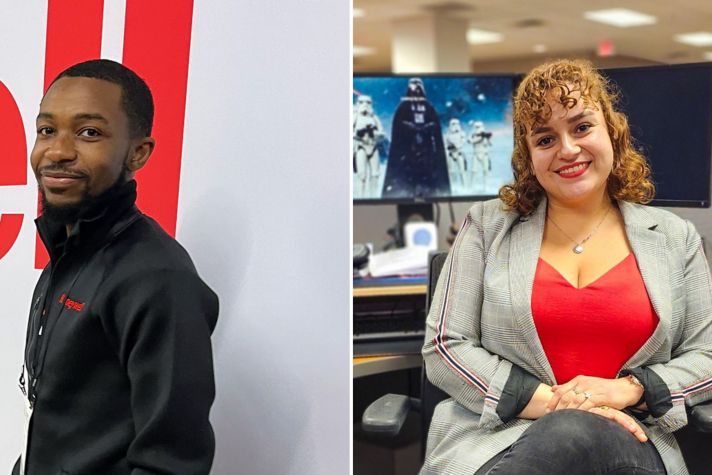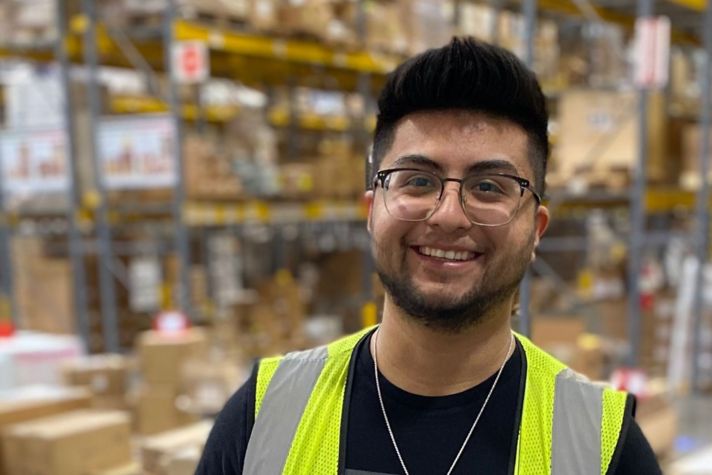-
Global
-
Africa
-
Asia Pacific
-
Europe
-
Latin America
-
Middle East
-
North America
- |
- BUSINESSES
- |
- Contact
- |
-
Global
-
Africa
-
Asia Pacific
-
Europe
-
Latin America
-
Middle East
-
North America
- |
- BUSINESSES
- |
- Contact
- |
You are browsing the product catalog for
You are viewing the overview and resources for
- News
- 11 Veterans Share the Value of Military Experience
11 Veterans Share the Value of Military Experience
How years in the armed service shaped the future for these professionals
Organization, time management, leadership.
Those are just a few of the skills that veterans say have carried into their post-military careers.
We asked 11 veterans at Honeywell who now serve in roles that range from engineering to sales, how their military experience shaped the professional they are today.
Here’s what they had to say:
Barbara Adams, Customer and Product Support Director

Service: U.S. Army, 5 Years, Captain, UH-IH Test Pilot and Aviation Maintenance Officer
What do you do?
I provide support of mechanical systems and components for customers and military programs.
How does your military experience shape your current role?
The experience I gained in Army Aviation was foundational to my career at Honeywell Aerospace. Having first-hand experience in pilot training, aircraft operations, maintenance programs for combat aviation brigades, field upgrades and collaborating with U.S. Government, foreign military and contractor teams translates directly to the work we perform and pursue today. Readily understanding the customers’ needs is crucial to ensuring responsive support and positive customer experiences for long-term relationships and growth opportunities. Also pictured at the top of the page.
Jonathan Bellamy, Sr. Customer Support Program Manager
 Service: Staff Sergeant in the United States Air Force, 6 years active duty, 3 years reserves, four tours of duty
Service: Staff Sergeant in the United States Air Force, 6 years active duty, 3 years reserves, four tours of duty
What do you do?
I support aerospace customers.
How does your military experience shape your current role?
In the military, you have people relying on you all the time. When people don’t do their jobs correctly, there can be major consequences. In the business world, you’ll often be expected to create actions with owners, to account for absolutely everything and to follow up with people to make sure they’ve done something. I learned from my military experience that keeping your word and following through with your specific tasks or actions is critical to getting the job done right and fast. Keep your word. If you say you’ll do something for someone, do it.
Scott Burngasser, Engineering Leader

Service: Petty Officer 2nd class in the United States Navy (1997-2001) Operation Enduring Freedom, Operation Southern Watch, Kosovo, Iraq, Afghanistan – Armed Forces Expeditionary
What do you do?
We design material handling automation systems with equipment including conveyors and sorters for major retail and packaging companies. I lead engineering teams of electrical, mechanical and software across the U.S., Mexico, India and Europe. These engineers design, then commission, automated material handling systems that can span more than 15 miles of conveyor systems that move packages and goods around a warehouse or distribution center.
How does your military experience shape your current role?
The experiences and skills that the military embodies I still use daily, including effective communication, being results-driven, organization, time management and leadership skills and diversity and inclusion of large teams.
Danielle Carosello, Government Business Leader

Service: Air Evacuation Officer and Medical Service Corps Officer in the United States Army (4 years reserve, 5 years active) 100% Service Disabled Veteran
What do you do?
I am responsible for the strategy to support federal, state and local government customers in the United States and Canada.
How does your military experience shape your current role?
Having been a “government customer,” I know what it means for a vendor to be aligned with the mission. My goal at Honeywell is to not only provide superior products, but also to meet the urgency of our government customers, and for them to be procured the simplest way possible.
Kyle Castor, Customer and Product Support Manager

Service: 3rd Class Petty Officer in the United States Navy Seabees (Naval Mobile Construction Battalion Forty), 5 years active duty, Performed construction work which mainly consisted of welding & fabrication, masonry, wood working and more. Deployed to Korea, Japan and Iraq.
What do you do?
I manage programs and repairs on platforms for the United States Government.
How does your military experience shape your current role?
The United States Navy and my experiences within the Seabees taught me attention to detail when reporting and analyzing high-level customer programs and acting with urgency when issues arise. The military experience also gave me the characteristics needed when working in a team environment and how to communicate effectively within that team. It’s also shaped my career through learning the importance of timeliness on projects, staying quality-focused, displaying professionalism and exhibiting the responsibility, reliability and mental strength that Honeywell demands in a professional career.
Brad Davis, project manager

Service: Sergeant First Class in the Texas State Guard (TXSG), 10 Years, Sergeant First Class (SFC), eight years in computer and communications and two years as Chaplain Corps.
What do you do?
I lead Business and IT Teams to deliver E-Commerce solutions.
How does your military experience shape your current role?
In the TXSG, I learned, experienced and practiced good leadership. I adopted our General's command philosophy when leading my teams at Honeywell. The bottom line is if you take care of your team, then your team will accomplish the mission. Brad Davis is pictured second from left.
Rick Davis, Advanced Field Service Engineer

Service: E6 in the United States Navy from 1973-1982 as a Submarine Sonar Technician
What do you do?
I develop training courses, both classroom and distance learning for Quality Control Systems that are used in the paper industry.
How does your military experience shape your current role?
Before and during my Navy experience I was interested in becoming a teacher. For my three-year shore duty, I was trained as an instructor, learning how to develop training to the Navy standard.
Paul Harris, Senior Channel Sales Representative

Service: Buck Seargant E-5 in the United States Army 1st Air Calvary Division, 1967-1969
What do you do?
I look after our export sales of the Notifier Fire Alarm Systems and have been with the company since 1993.
How does your military experience shape your current role?
My military experience taught me at a very young age, discipline, organizational skills and the importance of implementing plans and goals. It taught me to work with all types of personalities, cultures and ages. It taught me to respect the chain of command and I was honored to do my part to defend America’s freedom. My most prized possession was receiving the Bronze Star from the Army for my actions. My respect for authority and the American Flag still runs strong even to this day.
Mark Hedden, Solutions Architect

Service: Lt. Colonel in the United States Air Force, served 20 years, 12 combat tours, and flew military aircraft: MC-130H, EC-130H, and U-28s.
What do you do?
I look at our solutions across the whole company and determine how it can meet the needs of our defense customers.
How does your military experience shape your current role?
It has given me unique insights into the warfighter, their needs at the basic level, and how it connects to larger defense structures.
Shundra Kufner, Quality Assurance Inspector

Service: E-5 Petty Officer Second Class in the Navy; Active from 1989 to 1993; Reserves from 1996 -2002.
What do you do?
I inspect starters and valves for various aircraft.
How does your military experience shape your current role?
My military experience taught me honor, commitment and pride in my accomplishments and to be limitless. Shundra Kufner is pictured right.
Roger Zetterberg, Lead Systems Engineer

Service: Specialist Four in the United States Army; Paratrooper in the 82nd Airborne Engineering Battalion and worked as a mechanic in the Motor Pool, keeping all ground vehicles in top condition.
What do you do?
My responsibilities include customer support for the current product line, developing new methods for testing, develop new product enhancements, and perform testing and validation for software certifications.
How does your military experience shape your current role?
The military taught me to stay focused and remain calm regardless of the circumstances.
Copyright © 2025 Honeywell International Inc.




